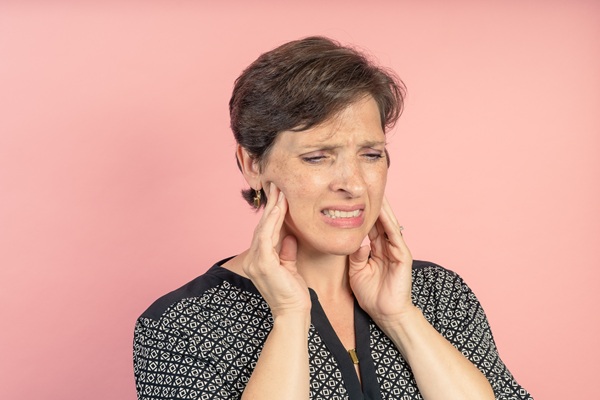What Is a TMJ Disorder?

Disorder of the temporomandibular joint, or TMJ, is a condition that can cause difficulty with jaw functions. The disorder can cause jaw pain that restricts how you open and close your mouth. You might notice clicking sounds or jaw locking when eating, talking or yawning. Continue reading to learn more about the symptoms, diagnosis and treatment of TMJ disorder.
The structure of the TMJ
The temporomandibular joint connects the mandible to the temporal bone of the skull. A small bit of cartilage called an articular disc is present between the two bones. When opening and closing the mouth, the disc moves as the jaw bone rotates and glides back and forth to enable movement.
Different muscles connect near the temporomandibular joint. The muscles allow easy opening and closing of the jaw for talking, eating and other mouth functions. Various ligaments connect the bones to make the joint stable.
Disorders of the TMJ
Symptoms of TMJ disorder often start slowly without connection to specific condition or injury. Patients may experience pain when chewing hard foods. The pain is usually intermittent and often starts after exerting too much pressure on the jaw or when opening the mouth wide, like when yawning. Some of the common causes of the condition include:
- Muscle spasms
- Dislocation of the articular disc in the joint
- Forward head posture
- Teeth grinding or clenching
- Stress
When the jaw joint is subjected to excessive stress, pain and joint movement dysfunction may occur. This may cause inflammation of the joint and muscles around the temporomandibular joint.
Diagnosing TMJ disorder
Anyone experiencing pain in the jaw joint will need to visit a dental professional. The dentist will ascertain the cause of the pain and provide a diagnosis of the condition. TMD diagnosis is mostly obtained through a clinical exam. The dentist may palpate the jaw joint and muscles, checking for tenderness or clicking when opening or closing the mouth.
The dentist will also check the jaw’s range of motion, searching for misalignments. Sometimes, the jaw may open properly on one side and not the other, forcing the jaw to move to one part when opening the mouth. Also, an x-ray may be taken to check for arthritis around the TMJ, and an MRI may reveal the situation of the articular disc in the jaw. After making a diagnosis, the dentist can work toward developing a treatment plan for the patient.
Depending on the patient’s condition, some of the treatment options for TMJ disorder include:
- Medications
- Stabilization splints or bite guards
- Physical therapy
- Dental Botox to reduce tension in the jaw muscles
- Cognitive-behavioral therapy to relieve stress
In rare cases, orthodontic treatment, arthrocentesis and joint replacement surgery might be recommended. The dentist will discuss the benefits and risks of these procedures and continue to monitor the patient during treatment.
Do you think you may be suffering from TMJ disorder?
Some patients with TMJ disorder get better without treatment. However, if you are experiencing symptoms of the condition, it is advisable to visit a dentist for diagnosis and treatment.
Request an appointment here: https://marcuccidental.com or call Marcucci Dental at (856) 776-7211 for an appointment in our Vineland office.
Check out what others are saying about our dental services on Yelp: TMJ Dentist in Vineland, NJ.
Related Posts
A dental bridge is often an important tooth-replacement option when one or more teeth are missing in the same area. Gaps in the smile affect chewing, speech, and overall oral health. Over time, missing teeth can also affect jaw alignment and place extra stress on the remaining teeth. Understanding how a bridge works helps patients…
If your teenager is in need of teeth straightening services, it is a good idea to look for an Invisalign® dentist. The two main types of teeth straightening options that teenagers are choosing nowadays are Invisalign® aligners and traditional metal braces. If your teenager is interested in getting Invisalign® clear aligners, then all you need…
A dental crown is a long-lasting dental restoration that helps restore the strength, appearance, and function of a severely damaged tooth. While these restorations are strong, proper dental crown care ensures their durability and prevents potential complications. The following guidelines can help you preserve your newly restored tooth and maintain your long-term oral health.A dental…
Teeth whitening is a popular cosmetic dental treatment. This procedure can effectively brighten your smile by addressing discoloration and stains. By understanding how teeth whitening targets stains, you can see how the process can restore your teeth to a cleaner and more youthful appearance.Tooth discoloration can occur for several reasons, and identifying the source is…
